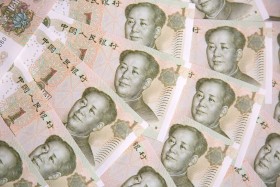The Chinese yuan is weakening against its major currency competitors to kick off the trading week. The yuan is trending downward on foreign exchange markets on new data that shows the central bank pumped $1.01 trillion into the worldâs second-largest economy in the first quarter. The Peopleâs Bank of China (PBoC) also generated headlines for raising its stake in the nationâs largest mortgage lender. Is the stimulus peanuts, or will Beijing place a limit on its monetary intervention?
According to the latest PBoC data, new bank loans soared $1.01 trillion during the January-to-March period, up from $10 billion during the same time a year ago. The latest quarterly lending is a record high, but nearly half of the total lending occurred in March when the economy was trying to return to normalcy.
The central bank has been doing everything it can to keep credit markets from cratering, introducing a whole host of measures to elevate lending: a cut in the reserve requirement ratio (RRR), a reduction in targeted interest rates, and bailing out financial institutions. The PBoC believes this is a better alternative than what the Federal Reserve is doing since the US pumped $1.6 trillion into credit markets but only produced $500 billion in new loans.
Sun Guofeng, director general of monetary policy at the PBoC, told reporters on Friday:
Chinaâs efficiency is ten times that of the Fed. Each yuan injected into the money supply generated 3.5 yuan worth of bank loans.
Zhou Xuedong, a PBoC spokesman, also noted at Fridayâs briefing:
Our internal assessment showed the amount [of liquidity injection] since January is overall appropriate and ample. Too much liquidity may bring a series of problems, such as overcapacity and the rise of regional financial risk.
In other central bank news, Beijing increased its stake in the Housing Development Finance Corp, the nation’s largest mortgage lender. The PBoC boosted its stake from 0.8% to 1.01%, comprising 17.49 million shares.
It should be noted that the PBoC possesses stakes in many businesses around the world, including Royal Dutch Shell and BP Plc.
On the data front, the March inflation rate tumbled 1.2%, down from the 0.8% gain in February. New motor vehicle sales crashed 43.3% last month, up from -79% in the previous month. The M2 money supply spiked at an annualized rate of 10.1% in March, up from 8.8% in February.
The USD/CNY currency pair rose 0.26% to 7.0546, from an opening of 7.0361, at 12:54 GMT on Monday. The EUR/CNY advanced 0.02% to 7.6955, from an opening of 7.6943.
If you have any questions, comments, or opinions regarding the Chinese Yuan, feel free to post them using the commentary form below.
